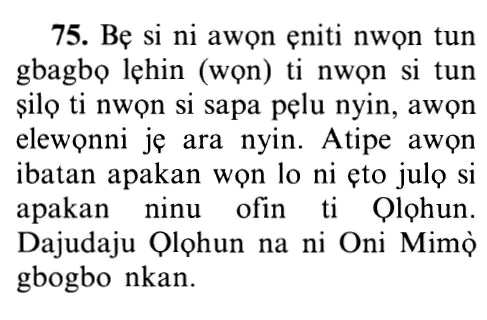8vs75
Select any filter and click on Go! to see results
وَالَّذِينَ آمَنُواْ مِن بَعْدُ وَهَاجَرُواْ وَجَاهَدُواْ مَعَكُمْ فَأُوْلَـئِكَ مِنكُمْ وَأُوْلُواْ الأَرْحَامِ بَعْضُهُمْ أَوْلَى بِبَعْضٍ فِي كِتَابِ اللّهِ إِنَّ اللّهَ بِكُلِّ شَيْءٍ عَلِيمٌ
Waallatheena amanoo min baAAdu wahajaroo wajahadoo maAAakum faolaika minkum waoloo alarhami baAAduhum awla bibaAAdin fee kitabi Allahi inna Allaha bikulli shayin AAaleemun
Index Terms
Click to play
Yoruba Translation

Hausa Translation
Kuma waɗanda suka yi ĩmãni daga bãya, kuma suka yi hijira kuma suka yi jihãdi tãre da ku, to, waɗannan daga gare ku suke. Kuma ma´abũta zumunta, sãshensu ne waliyyan(2) sãshe a cikin Littãfin Allah. Lalle Allah ne ga dukkan kõme Masani.
Asbabu n-Nuzuul (Occasions of Revelation)
وَالَّذِينَ آمَنُواْ مِن بَعْدُ وَهَاجَرُواْ وَجَاهَدُواْ مَعَكُمْ فَأُوْلَـئِكَ مِنكُمْ ...
And those who believed afterwards, and emigrated and strove hard along with you, they are of you.
Allah then mentioned that those who follow the path of the believers in faith and performing good deeds, will be with them in the Hereafter.
Just as Allah said,
وَالسَّـبِقُونَ الاٌّوَّلُونَ
And the foremost to embrace Islam... (9:100), until the end of the Ayah.
He also said,
وَالَّذِينَ جَآءُوا مِن بَعْدِهِمْ
And those who came after them ... (59:10)
A Hadith that is in the Two Sahihs, which is Mutawatir and has several authentic chains of narrations, mentions that the Messenger of Allah said,
الْمَرْءُ مَعَ مَنْ أَحَب
One will be in the company of those whom he loves.
Another Hadith states,
مَنْ أَحَبَّ قَوْمًا فَهُوَ مِنْهُم
He who loves a people is one of them,
and in another narration, he said,
حُشِرَ مَعَهُم
...will be gathered with them (on the Day of Resurrection).
Inheritance is for Designated Degrees of Relatives
Allah said,
... وَأُوْلُواْ الأَرْحَامِ بَعْضُهُمْ أَوْلَى بِبَعْضٍ فِي كِتَابِ اللّهِ ...
But kindred by blood are nearer to one another (regarding inheritance) in the decree ordained by Allah,
meaning, in Allah's decision.
This Ayah encompasses all relatives, not only the degrees of relative who do not have a fixed, designated share in the inheritance, as some people claim and use this Ayah to argue.
According to Ibn Abbas, Mujahid, Ikrimah, Al-Hasan, Qatadah and several others, this Ayah abrogated inheriting from those with whom one had ties of treaties or brotherhood, as was the case in the beginning of Islam. So it applies to all relatives, and as for those who do not inherit, then this is supported by the Hadith,
إِنَّ اللهَ قَدْ أَعْطَى كُلَّ ذِي حَقَ حَقَّهُ فَلَا وَصِيَّةٍ لِوَارِث
Indeed Allah had allotted every right to the one who deserves it, so there may be no will for an heir.
Therefore, this Ayah also includes those who have a fixed share of inheritance. Allah knows best.
... إِنَّ اللّهَ بِكُلِّ شَيْءٍ عَلِيمٌ ﴿٧٥﴾
Verily, Allah is the All-Knower of everything.
This is the end of the Tafsir of Surah Al-Anfal, all praise and thanks are for Allah, in Him we trust, and He is sufficient for us, what an excellent supporter He is.
وأما قوله تعالى " وأولوا الأرحام بعضهم أولى ببعض في كتاب الله " أي في حكم الله وليس المراد بقوله " وأولوا الأرحام " خصوصية ما يطلقه علماء الفرائض على القرابة الذي لا فرض لهم ولا هم عصبة بل يدلون بوارث كالخالة والخال والعمة وأولاد البنات وأولاد الأخوات ونحوهم كما قد يزعمه بعضهم ويحتج بالآية ويعتقد ذلك صريحا في المسألة بل الحق أن الآية عامة تشمل جميع القرابات كما نص عليه ابن عباس ومجاهد وعكرمة والحسن وقتادة وغير واحد على أنها ناسخة للإرث بالحلف والإخاء اللذين كانوا يتوارثون بهما أولا وعلى هذا فتشمل ذوي الأرحام بالاسم الخاص ومن لم يورثهم يحتج بأدلة من أقواها حديث " إن الله قد أعطى كل ذي حق حقه فلا وصية لوارث " قالوا فلو كان ذا حق لكان ذا فرض في كتاب الله مسمى فلما لم يكن كذلك لم يكن وارثا والله أعلم . آخر تفسير سورة الأنفال ولله الحمد والمنة وعليه التكلان وهو حسبنا ونعم الوكيل .
"والذين آمنوا من بعد" أي بعد السابقين إلى الإيمان والهجرة "وهاجروا وجاهدوا معكم فأولئك منكم" أيها المهاجرون والأنصار "وأولو الأرحام" ذوو القرابات "بعضهم أولى ببعض" في الإرث من التوارث في الإيمان والهجرة المذكورة في الآية السابقة "في كتاب الله" اللوح المحفوظ "إن الله بكل شيء عليم" ومنه حكمة الميراث
يريد من بعد الحديبية وبيعة الرضوان . وذلك أن الهجرة من بعد ذلك كانت أقل رتبة من الهجرة الأولى . والهجرة الثانية هي التي وقع فيها الصالح , ووضعت الحرب أوزارها نحو عامين ثم كان فتح مكة . ولهذا قال عليه السلام : ( لا هجرة بعد الفتح ) . فبين أن من آمن وهاجر من بعد يلتحق بهم . ومعنى " منكم " أي مثلكم في النصر والموالاة .
I'raab - grammatical analysis of the Qur'an
و الذين آمنوا .. كإعراب سابقتها.
«مَعَكُمْ» ظرف مكان متعلق بالفعل.
«فَأُولئِكَ» اسم إشارة مبني على الكسر في محل رفع مبتدأ. والفاء رابطة لما في اسم الموصول من شبه الشرط.
«مِنْكُمْ» متعلقان بمحذوف خبر المبتدأ ، والجملة الاسمية خبر اسم الموصول.
«وَأُولُوا» مبتدأ مرفوع وعلامة رفعه الواو لأنه ملحق بجمع المذكر السالم.
«الْأَرْحامِ» مضاف إليه.
«بَعْضُهُمْ» مبتدأ.
«أَوْلى » خبره مرفوع وعلامة رفعه الضمة المقدرة على الألف للتعذر.
«بِبَعْضٍ» متعلقان بالخبر أولى. والجملة الاسمية بعضهم أولى ببعض في محل رفع خبر أولو ، والجملة مستأنفة.
«فِي كِتابِ» متعلقان بمحذوف خبر هذا منزّل في كتاب اللّه.
«إِنَّ اللَّهَ بِكُلِّ شَيْءٍ عَلِيمٌ» إن واسمها وخبرها.
«بِكُلِّ» متعلقان بالخبر «عَلِيمٌ» و«شَيْ ءٍ» مضاف إليه والجملة مستأنفة.
